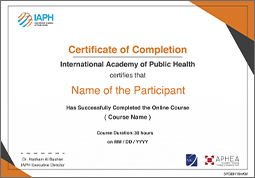Infection Control-Level 1
Description
All health care professionals must understand the principles and demonstrate competence in preventing and controlling infections, including those that are associated with healthcare, and apply this knowledge as a routine part of their prescribing practice to protect patients, visitors, their colleagues, and themselves from the risk of antimicrobial-resistant infection.
The principles of infection control are coupled with the science of microbial transmission and reproduction. This course is designated to provide the candidate with the basic knowledge and skill of the most important bacterial, fungal, parasitical, and viral infection to prevent the transmission of organisms in health care settings.
Learning Outcomes
- Describe and explain the infectious disease process (infection chain)
- List type of reservoir of infection in human
- Define carriers and list their types
- Define zoonoses and list examples
- Identify the different modes of transmission of the organisms
- Describe the principle of infection control in hospital and community based setting
- Differentiate between four types of transmission precautions
- Microorganisms and Infection
- Transmissions and Precautions
- Immunization of Healthcare Worker
- Management of Post-Exposure to Pathogens Session

Duration:
30 Learning Hours
Accredited By:


Certificate

Are you interested in the course?
Get notified once the course is open by clicking on
Infection Control-Level 1
Thank you for registering your interest! We appreciate your enthusiasm for this course. As soon as it becomes available, we will reach out to you with all the details. Stay tuned!